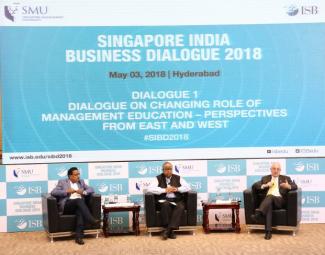
Singapore Management University and Indian School of Business (ISB) co-organised the 5th edition of the Singapore India Business Dialogue (SIBD) which was held at the ISB at Hyderabad, India, on 3 May 2018. The event brought together some 300 participants comprising policy makers, academics, industry leaders, media, SMU alumni and ISB students to share insights and perspectives on “Managing Disruptions in the Age of Technology”, with the focus on Education, Innovation and Fintech.
At the opening of the dialogue, ISB Dean Rajendra Srivastava noted that disruptions due to digital technologies presented opportunities for Singapore as the economic hub of ASEAN and Southeast Asia, and cities like Hyderabad, Mumbai and Bangalore, as the economic hubs of India, to work together.
Co-organiser SMU President Arnoud De Meyer said that “this dialogue is about how we can provide strategic responses to disruptive innovations, and explore the strategic partnership between Singapore and India”. He highlighted that SMU was interested in what the phenomenon of digital transformation could do to the different disciplines that SMU had. He said, “SMU is committed to nurturing future-ready students. What we try to ensure at the university is to constantly adapt our curriculum and change the way and what we teach, because we want to ensure what we offer to our students and the employers of our students, is an education that is what is needed today.”

In his keynote address, SMU Associate Professor of Information Systems Paul Griffin, pointed out that the future of payments was not cryptocurrencies nor blockchains. He said that decentralisation was the next big phenomena which will both disrupt and provide the ground for many innovations across all industries.
“The big change which is happening, the big paradigm shift, is this movement from centralised system where you have sole ownership. And you start breaking down the walls, and work in globalised partnerships. When you put that into codes and the entities, companies can work together with many different scales and players in the system,” said Prof Griffin. He also cited many research areas whereby SMU was working closely with the financial industry in Singapore to delve into the real practicalities of how to reap the benefits and uncover the risks with solid research from business, governance and technical aspects.

The third and concluding session, themed “Strategic Response to Disruptive Innovation”, delved into the possibility of crafting strategies to respond to disruptive innovations. SMU Professor of Marketing Srinivas K Reddy said, “You have to be brave enough to embrace cannibalisation. If you don’t transform, somebody else will.”
In sharing how Amazon had grown, he said, “Believe me, in two to five years, Amazon will be competing with Google Search.” He also analysed some case examples and the negative outcomes of responses to disruptions which were either too aggressive or lukewarm.
Government of Telangana Chief Secretary, S K Joshi, and ISB Dean Srivastava delivered remarks at the close of the 5th edition of the SIBD.

Launched in 2012, the annual half-day dialogue promotes the sharing of insights and knowledge on issues and developments of interest to Singapore, India and the rest of Asia. The 5th edition of the SIBD was co-organised by SMU International Office and ISB.
[Featured photo: (L-R) V Venkata Ramana, Vice Chairman, Telangana State Higher Education Council, Rajendra Srivastava, Dean, Indian School of Business, (Chair of the dialogue) and Arnoud De Meyer, President, Singapore Management University.]